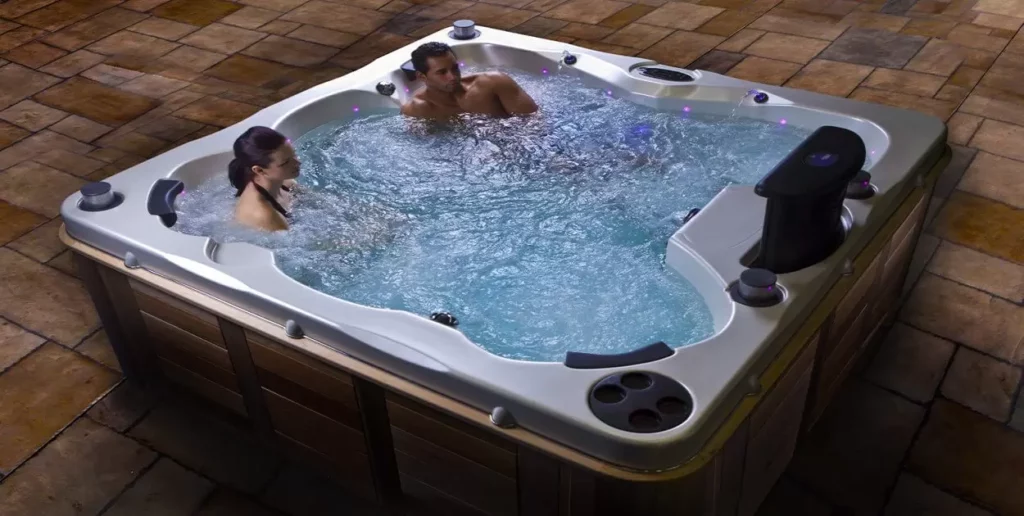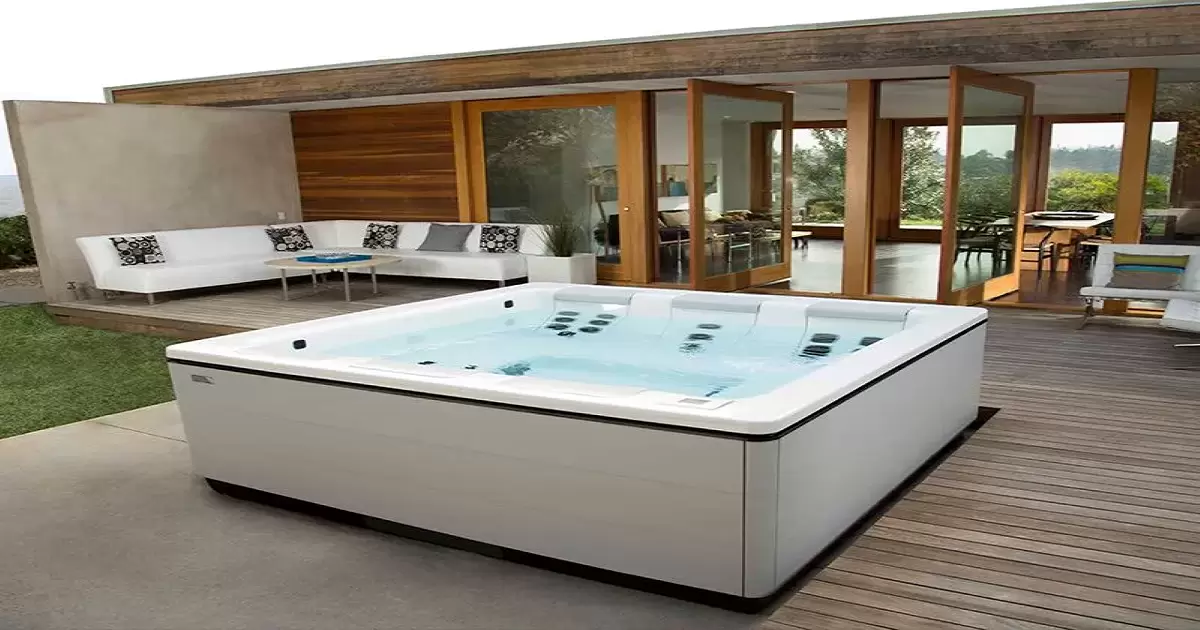How long does it take for a Jacuzzi to heat up? The time it takes for a Jacuzzi to reach your desired temperature can vary depending on its size, heater power, and starting water temperature. On average, it can take anywhere from 20 minutes to a few hours for a Jacuzzi to heat up to a comfortable soaking temperature.
Ready for a soothing soak? Ever wondered, How long for a Jacuzzi to heat up? The answer could surprise you. Discover the secrets of Jacuzzi heat-up times and how to enjoy your spa experience faster. Get ready to unwind and relax in no time.
The time it takes for a Jacuzzi to heat up is known as the heat up time.This duration can vary based on the Jacuzzi’s size and heating system. On average, it may take anywhere from 20 minutes to several hours for the water to reach a comfortable, relaxing temperature.
How quickly can I use my hot tub after it is delivered?
After your hot tub is delivered, the first thing you’ll eagerly anticipate is a relaxing soak. However, the wait time before enjoying your Jacuzzi can vary. The key factor is the heat-up time. This depends on your Jacuzzi’s size and heating system. Smaller hot tubs with efficient heaters can heat up in as little as 20-30 minutes, offering a quick escape into warm, soothing waters. Larger tubs or those with less powerful heaters may take a bit longer, anywhere from a few hours to reach your desired temperature. So, your post-delivery Jacuzzi enjoyment hinges on the time it takes to heat up.
To minimize your wait time, you can plan ahead by programming your hot tub to heat up before your preferred soak time. This way, it’s ready when you are. Keep in mind that energy-efficient models may take longer to heat but can save on utility costs in the long run. So, while the wait can be variable, the promise of relaxation and rejuvenation in your Jacuzzi is well worth it.
What factors affect how quickly a hot tub heats up?
The temperature of a Jacuzzi is influenced by various factors, impacting how quickly it heats up. One critical element is the heater’s power. A more potent heater can raise the water temperature in a Jacuzzi more rapidly. The starting water temperature also plays a role, as colder water takes longer to warm up. Additionally, the size of the Jacuzzi matters; larger tubs will naturally take longer to heat than smaller ones. Proper insulation and a well-fitted cover can help retain the heat, making the heating process more efficient.
Other aspects affecting Jacuzzi temperature include weather conditions. Cold or windy weather may slow down the heating process, while a warm environment can speed it up. Regular maintenance of the heating system is crucial to ensure it operates efficiently. Properly sized heating elements, clean filters, and well-maintained water circulation systems all contribute to maintaining the ideal temperature in a Jacuzzi. In essence, multiple factors interplay in determining how quickly a Jacuzzi reaches the desired temperature, and understanding these variables can enhance your spa experience.
Temperature of the water going into the hot tub
The temperature of the water going into a hot tub plays a crucial role in ensuring a comfortable and enjoyable soak. Ideally, the water should be relatively cold when it enters the hot tub. Many hot tub owners prefer water temperatures ranging from 50 to 60 degrees Fahrenheit (10 to 15 degrees Celsius) as it provides a refreshing starting point. Starting with cooler water allows the hot tub’s heater to efficiently warm it up to the desired temperature, reducing energy consumption.
Gradually heating the water is not only energy-efficient but also helps maintain a longer lifespan for the hot tub’s components. It’s important to monitor the water temperature as it enters the tub to strike a balance between energy savings and a relaxing, warm soak.
Climate
Climate plays a crucial role in our daily lives, impacting the weather, ecosystems, and our overall well-being. It encompasses long-term patterns of temperature, humidity, precipitation, and more in a given region. Our understanding of climate is vital for making informed decisions, as it influences everything from agriculture and infrastructure planning to the prevalence of extreme weather events and sea level rise. Monitoring and addressing climate change is a global imperative.
Insulation
Insulation is a crucial element in maintaining comfortable indoor temperatures and energy efficiency. It acts as a barrier to heat flow, preventing warm air from escaping during the winter and keeping out hot air in the summer. This not only enhances comfort but also reduces energy bills. Insulation comes in various forms, such as fiberglass, foam, or cellulose, and should be properly installed to maximize its effectiveness. Proper insulation is an investment that pays off in improved home comfort and energy savings.
Heat source
The heat source is a crucial component in various heating systems. It provides the energy needed to warm a space, heat water, or generate steam for different applications. Common heat sources include electric heaters, natural gas, oil, or even renewable sources like solar panels. The choice of a heat source impacts efficiency, cost, and environmental considerations, making it a key decision in designing heating solutions.
Size of heat source
The size of a heat source, whether it’s a furnace, heater, or a fireplace, is crucial for effectively warming your space. A larger heat source can heat a room more quickly and maintain a comfortable temperature, while a smaller one may struggle to do so. Properly sizing your heat source ensures you stay warm and cozy during those chilly days and nights.
Water volume
Water volume refers to the quantity or capacity of water in a given space or container. It’s commonly measured in liters or gallons and is crucial in various applications. In household use, knowing the water volume helps determine utility bills and proper plumbing. In industries, it’s essential for efficient processes. Water volume plays a pivotal role in agriculture, aquaculture, and environmental management. Accurate measurement and management of water volume are key for practical and sustainable resource use.
Desired water temperature
The desired water temperature in a Jacuzzi is a matter of personal preference. Many people prefer a temperature range of 100-104°F (37-40°C) for a relaxing and comfortable soak. However, it’s essential to adjust the temperature to your liking, considering factors like weather, health, and comfort. Always be mindful of safety and avoid extremely hot water to prevent discomfort or health issues.
Maintenance and efficiency
Maintenance and efficiency are essential factors in keeping any system or appliance running smoothly. Regular maintenance, such as cleaning filters and checking for leaks, helps ensure optimal performance and prolongs the lifespan of equipment. Efficient operation not only saves energy and costs but also reduces environmental impact. It’s vital to strike a balance between maintenance and efficiency to maximize the benefits of any system while minimizing the drawbacks.
How long does it take to heat up a Jacuzzi® hot tub – the facts
Curious about how long it takes to heat up a Jacuzzi® hot tub? The time it takes can depend on various factors. Firstly, the size of the hot tub plays a crucial role. Smaller models with less water will heat up faster, often within 1-2 hours. Larger hot tubs, with more water to warm, may take 4-6 hours or even longer. Secondly, the power of the heater matters. A high-powered heater will heat the water more quickly. And finally, the initial water temperature also impacts the heat-up time. Starting with colder water can add extra time to the process.
In summary, there’s no one-size-fits-all answer to how long it takes to heat up a Jacuzzi® hot tub. It varies based on the specific hot tub, its size, heater power, and starting water temperature. To ensure a timely and enjoyable soak, plan ahead, and consider turning up the heat well before you intend to use your Jacuzzi®. This way, you’ll have a warm and inviting oasis waiting for you when you’re ready to relax.

How can outside temperature affect hot tub heating time?
The outside temperature can significantly impact the heating time of a hot tub. During colder weather, especially in the winter, the hot tub needs to overcome a greater temperature difference between the frigid outdoor air and the desired water temperature. This means the heating element has to work harder and longer to reach the set temperature. In extreme cold, it may take hours for the hot tub to heat up, increasing energy consumption.
Conversely, in warmer weather, the hot tub’s heating time is reduced as it doesn’t need to work as hard to reach the desired temperature. So, the outside temperature can make a substantial difference in how quickly you can enjoy your hot tub, affecting your overall comfort and utility costs.
| Factors Affecting Heat-Up Time | Average Time Range |
| Jacuzzi Size | 20 minutes – 2 hours |
| Heater Power | 20 minutes – 1 hour |
| Starting Water Temperature | Varies, can be 2-4 hours or more |
| Maintenance & Insulation | Can speed up heating |
| Weather Conditions | May affect heat-up time |
| Tips to Expedite Heating | Regular maintenance, efficient heater |
Why does my hot tub take so long to heat up?
If you’ve ever wondered why your hot tub takes so long to heat up, there are a few factors at play. The most significant factor is the size of the hot tub. Larger tubs have a greater water volume, which naturally takes more time to heat. Additionally, the power of the heater is crucial. A more powerful heater can heat the water faster. Furthermore, starting water temperature plays a role; if your tap water is very cold, it will take longer to reach the desired temperature.
Another consideration is the insulation of your hot tub. Well-insulated tubs retain heat better, reducing heat-up time and energy consumption. Regular maintenance, like cleaning and descaling the heating elements, can also affect heating efficiency. Understanding these factors can help you manage your hot tub’s heating time more effectively, ensuring you spend less time waiting and more time enjoying a warm, relaxing soak.
How can I heat my hot tub up quicker?
If you want to heat your hot tub up more quickly, there are several strategies you can use. First, consider investing in a more powerful heater. A higher wattage heater can significantly reduce heat-up times. Additionally, insulating your hot tub cover can help retain heat, ensuring it warms up faster and stays warm longer.
Another tip is to keep your hot tub covered when you’re not using it, as this prevents heat loss. You can also use a thermal blanket or floating cover to further insulate the water. Finally, starting with water at a higher temperature, such as using hot tap water to fill the tub, can expedite the heating process. By implementing these measures, you can enjoy your hot tub sooner and save energy in the long run.
How soon can I use my hot tub after drain and refill?
After draining and refilling your hot tub, it’s essential to consider water temperature and chemical balance before taking a dip. Typically, it’s recommended to wait at least 12 to 24 hours before using your hot tub again. During this time, the water heater and filter system will work to heat and circulate the new water. This ensures the water reaches a safe and comfortable temperature.
Once the water is sufficiently heated and the chemical levels are balanced, you can enjoy your hot tub. Be sure to test the water quality and add any necessary chemicals to maintain safe pH and sanitizer levels. Following these guidelines not only ensures your safety but also enhances your hot tub experience, allowing you to relax and unwind with peace of mind.
FAQs
How long does a Jacuzzi take to heat up Celsius?
A Jacuzzi typically takes about 1 to 2 hours to heat up to a comfortable temperature in Celsius, depending on its size and heating system. It’s important to monitor the temperature to ensure it’s safe for soaking.
Why does my Jacuzzi take so long to heat up?
Your Jacuzzi’s heat-up time can vary based on its size and heating power. Larger tubs and lower-power heaters may take longer. Ensure proper maintenance, insulation, and ambient temperature for faster heating.
How does a Jacuzzi get warm?
A Jacuzzi gets warm through its built-in heater. The heater warms the water in the tub, allowing you to enjoy a relaxing and comfortable soak at your desired temperature.
Will hot tub heat faster with jets on?
No, running the jets in a hot tub won’t make it heat faster. In fact, it can slightly slow down heating since the energy used by the jets may offset the heating process.
Why isn t my jacuzzi warming up?
1. Check the thermostat setting and ensure it’s at your desired temperature.
2. If it’s still not warming up, inspect the heater and circulation system for any malfunctions, and consider professional service if necessary.
Conclusion
In conclusion, the time it takes for a Jacuzzi to heat up can vary, depending on several factors. The size of the Jacuzzi, the power of its heater, and the starting water temperature all play crucial roles in determining the heat-up duration. On average, you can expect it to take anywhere from 20 minutes to a few hours to reach a comfortable soaking temperature.
However, the key takeaway is that patience is often rewarded with a relaxing and enjoyable spa experience. While it may require some time for the water to heat up, it’s an essential aspect of ensuring the safety and efficiency of your Jacuzzi. Proper maintenance and heater upkeep can also help expedite the process. So, whether you’re eager to unwind after a long day or plan a spontaneous soak, understanding the heat-up time will allow you to make the most of your Jacuzzi while staying comfortable and stress-free.








